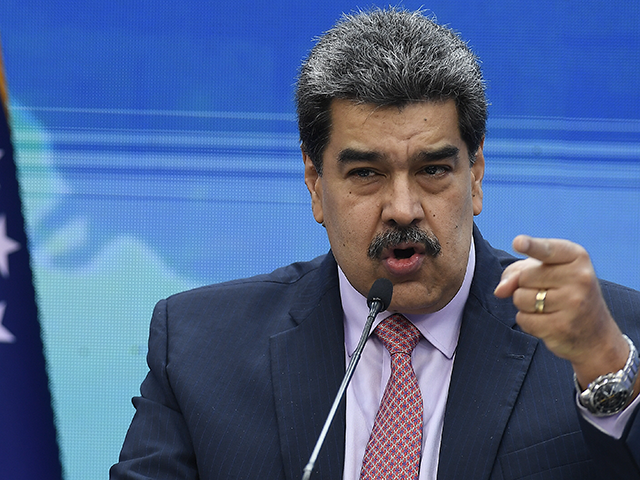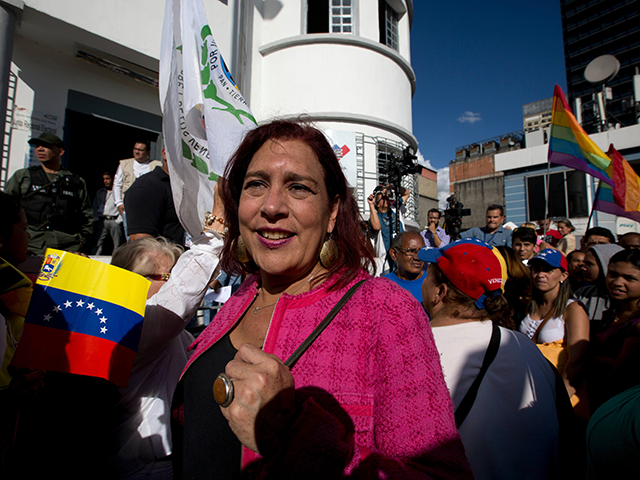CARACAS, Venezuela — Venezuelan transgender former lawmaker Tamara Adrián announced on Thursday a run in the upcoming primary elections to represent the Venezuelan “opposition” against socialist dictator Nicolás Maduro.
Maduro’s longstanding socialist regime will administer a presidential election in 2024, largely expected to be a sham given Maduro’s long history of unfree and unfair “elections.”

Nicolas Maduro, Venezuela’s president, speaks during a press conference at Miraflores Palace in Caracas, Venezuela, on Wednesday, Nov. 30, 2022. (Matias Delacroix/Bloomberg via Getty Images)
The pro-LGBT, anti-Maduro “United for Dignity” (UFD) party announced the 69-year-old transgender lawyer’s candidacy at a press conference on Thursday morning.
“We are motivated by everything that is happening in our country, the great political, economic and social crisis. We, who come from social movements, want to propose new ideas for the construction of the country we dream of,” said UPD member Koddy Campos. The political movement stated that they are not only an LGBT movement but that they “seek to be the representation of all social sectors.”
Adrián is a member of the Popular Will party, nominally an “opposition” party but formally a full member of the Socialist International, like several other organizations claiming to oppose Maduro’s United Socialist Party of Venezuela (PSUV). Popular Will and several other parties have formed a group called the “Unitary Platform” in response to Maduro’s call to hold an election fully administered by his corrupt narco-regime.
The Unitary Platform announced in February the start of all corresponding proceedings towards holding a primary election on October 22 to choose the “opposition” candidate that will go against Maduro in the upcoming 2024 sham presidential elections.
The Unitary Platform aims to count on the participation of both the Venezuelans residing in the country and those who have fled from socialism — estimated to be at over 7.2 million as of late March.
Adrián was elected to be part of the country’s National Assembly in 2015, becoming the country’s first transgender lawmaker, representing Popular Will. The transgender lawyer joins the ranks of a handful of “opposition” candidates that have so far announced their candidacy for the upcoming primary.
Venezuelan news website Noticiero Digital reported that, although Adrián’s candidacy was announced by the UPD political movement, the former lawmaker remains a member of Popular Will according to a party representative. Adrián asserted to the Venezuelan newspaper El Nacional that the candidacy “does not necessarily” imply a departure from Popular Will.
The Popular Will party announced in March that former interim president Juan Guaidó will be the party’s candidate for the primary elections. In addition to Adrián and Guaidó, perennial “opposition” candidate Henrique Capriles Radonski has also announced his run in the upcoming primary elections, representing the Justice First party. Capriles was banned from running or holding any kind of public office by the Maduro regime for a period of 15 years in 2017, leaving unclear the results of any potential victory on his part.
Other candidates that have so far announced their candidacy for the upcoming primary elections are conservative former lawmaker María Corina Machado of the Vente Venezuela party, who declared that socialism is the main enemy of Venezuelans, and comedian Benjamín Rausseo, who will run as an independent.
A poll conducted by the Venezuelan polling agency Consultores 21 in between February and March showed that Henrique Capriles Radonski — who lost against Hugo Chávez in 2012 and Nicolás Maduro in 2013 — leads likely voters with 24.8 percent against María Corina Machado’s 19.2 percent and Benjamín Rausseo’s 14.8 percent. Juan Guaidó, who was the country’s legitimate interim president between 2019 and 2022, only has a 7.1 percent approval according to the poll.
Another poll run by Consultores 21 in March showed that only 15 percent of the electorate — which would translate to roughly 2 million Venezuelan citizens — expressed their willingness to participate in the “opposition” primary elections. The polling agency noted that the poll was run at the request of the Justice First party, whose candidate has openly called for an end of the sanctions imposed on the Maduro regime by the United States and other countries.
Another poll conducted by Venezuelan polling agency Hinterlaces in March showed that 12 percent of respondents chose Machado as the best candidate to go against Maduro, with Rausseo in second place with eight percent.
1/5 PRIMARIAS DE LA OPOSICIÓN: Intención de voto por autodefinición política (Primero en mente / Sin lista) #MonitorPais Hinterlaces Marzo 2023 pic.twitter.com/hj9rE2xfST
— Hinterlaces (@Hinterlaces) March 31, 2023
Nicolás Maduro, whose last legitimate six-year presidential term ended in January 2019, clung to power by organizing a sham presidential election in May 2018 where only candidates he personally approved were allowed to run, granting him a new six-year term until 2024. Under normal circumstances, Venezuela would have held presidential elections in late 2018 instead.
The sham election was not recognized by much of the free world, and prompted the then-opposition-led National Assembly to act according to what the Venezuelan constitution determines was a “rupture in the democratic order,” which allows the legislative branch to appoint its head as interim president. Thus, the Assembly designated Juan Guaidó as the country’s legitimate yet powerless president.
Despite receiving the international recognition of 50 some countries – including the United States, Canada, the United Kingdom, and the European Union – Guaidó and the Venezuelan “opposition” failed to stop Maduro’s usurpation of power, establish a transitory government, and hold free and fair elections as he initially promised. The opposition-led legislative body, which Adrián was part of, was ousted by the Maduro regime through a sham election held in 2020 a group of “opposition” parties and politicians legitimized by their participation.
Although ousted and replaced by a new, overwhelmingly pro-Maduro legislative body, the opposition-led National Assembly is still recognized by the United States as “the only democratically elected institution left in Venezuela today” and continues to operate as a parallel legislative body with no real power in the country, as many of its members now living in exile abroad. The opposition-led National Assembly voted to dissolve Juan Guaidó’s interim government in December, leaving Maduro’s rule over the country uncontested since.
The socialist dictator was originally elected ten years ago on April 14, 2013, defeating Capriles by roughly 223,000 votes in emergency presidential elections that took place after the death of Hugo Chávez in March 2013. Capriles did not initially recognize the results and accused Maduro of stealing the election, leading to a brief period of political unrest and protests in the country. He later quietly stopped challenging the results.
Although Maduro announced in March that his regime will hold “free and fair” presidential elections in 2024, the socialist regime has entertained the idea of holding them in 2023 instead. Maduro expressed on Thursday, “We don’t know if the presidential elections will be this year or next year — hold that secret for me.”
The prospect of holding “free and fair” elections against Maduro was promoted by U.S. Secretary of State Antony Blinken during his Latin American tour in October. The socialist regime has insisted that it will not sign any agreement with the Venezuelan “opposition” to hold “free and fair” elections until the United States, the European Union, and other countries first rescind all sanctions imposed on the socialist regime and its officials, which they have dubbed as “sanctions-free fair elections.”
Christian K. Caruzo is a Venezuelan writer and documents life under socialism. You can follow him on Twitter here.

COMMENTS
Please let us know if you're having issues with commenting.